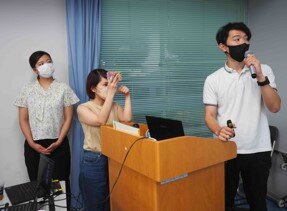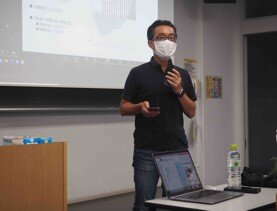“Lean Launchpad 2022/Practical Group Work for Leadership” was held from May to July in 2022, and included seven workshops. As a participant in these workshops, you will have the opportunity to create new business relationships with other members of the group.
・Group of Course: Leadership, followership, and consensus building
・Course: TAL.W505 /TAL.W603 Master’s Practical Group Work for Leadership I/II<S>,Doctoral Practical Leadership I/II<S>
・Program: Lean Launchpad #6
・Date & Time: 15/Jul/2022 18:15-21:45
・Facilitator, Takashi Tsutsumi from Entrepreneurship Learning Lab.
Introduction
The “Lean Launchpad” program was originally developed by Steven Blank, an entrepreneur in Silicon Valley, USA. As part of this program, your group will discuss new ideas for business ventures. This program consists of the following main contents:
・How can a value proposition be built?
・How should a business model be designed?
・The test of the Value Proposition and the development of the Main Value Proposition in an iterative manner.
・What is the process for creating a profit model?
・What are the steps to establishing a scalable business?
・How should a business presentation be conducted?
The practice of solving the above question will allow you to understand “what is innovation”, “what is business,” and “what drives society”; uncovering “issues” on your own, presenting “solutions” for those issues, and receiving feedback from society.
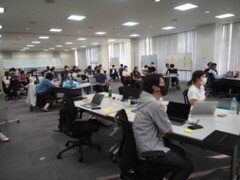
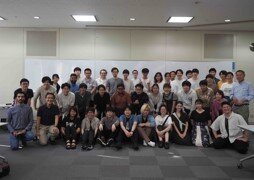
(2-day camp in Fuchu as #1 of this program on 28-29/May)
Activities Report in LLP-6
The “LLP-6” was held on July 15, 2022. Both online and offline participation is possible in this activity. Despite the fact that it is raining cats and dogs today, most of the students are participating in the activity offline. Today’s main topic is to present activity reports from each team and prepare for the final presentation. There are four parts to today’s activity.
First, Mr. Tsutsumi, facilitator of this workshop, provides an overview of today’s presentation. During this time, each team prepared its presentation and discussed it with the other members of the group.
The second part of the program includes presentations by eight teams regarding new business opportunities. Below is a detailed description of the contents of the team.
- STEP
・Idea: Online restaurant matching services will be provided to match the tastes of customers.
・Members: Kitsukawa Ikuo, Kira Mayuko, Matsuzawa Junna, Fujimoto Seiya
- Poetry Factory
・Idea: Providing original wrapping paper with poetry designs for clients to meet their needs.
・Members: Yamamoto Kaoru, Funaoka Yoshiki, Furubayashi Sho
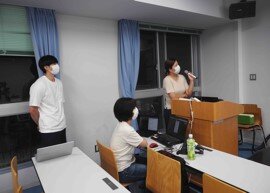
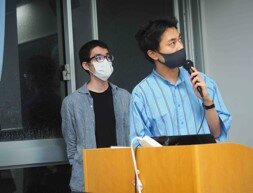
(From the left: Steps, Poetry Factory)
- Process
・Idea: This is a service that provides feedback and money for artwork that is in progress.
・Members: Takahashi Kenichiro, Yokoo Yukimaru, Hasegawa Takahiro
- Freehand
・Idea: Installing trash cans for registered users that open and close with QR code or NFC authentication
・Members: Maruyama Yuki, Nagao Yuma, Takashima Sora, Tomori Yuki, Kai Seigo
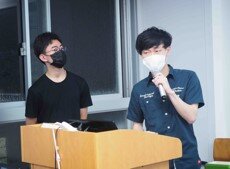
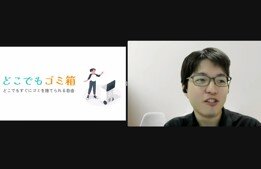
(From the left: Process, Freehand)
- Arashi
・Idea: Providing real-time translation services by connecting you with existing freelance translators and native speakers over the phone or video.
・Members: Leo Sylvia, Kato Yusuke, Mori Yuki, Ohno Satoshi, Xu Shuya
- outa’
・Idea: A web service was developed which connects males who are interested in changing their look through fashion, with beauticians.
・Members: Ono Koki, Miyake Yutaro, Nomura Yuuka, Kano Megumi, Okuma Hinako
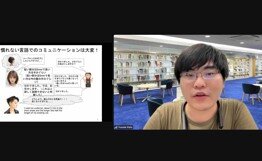
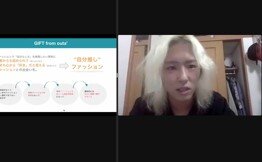
(From the left: Arashi, outa’)
- Haraguchi
・Idea: Services for the management of family health.
・Members: Haraguchi Haruna
- Amigo
・Idea: The purpose of this app is to help people find friends by focusing solely on their personalities and interests, without requiring any physical information or profile pictures.
・Members: Gecchele Marcello, Goo Kang Wei, Kawamura Marie, Lieberman Brandon, Muhammad Shakeel
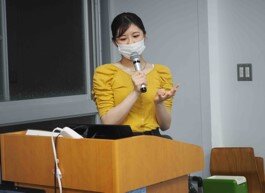
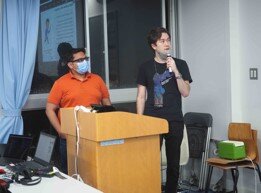
(From the left: Haraguchi, Amigo)
After the presentation, Mr. Tsutsumi and advisers provide comments to each team. There is a great advantage to this lecture in that not only will the members work together on the project, all the members of the lecture will be able to provide feedback to make the idea better. In specific, the students in other groups could provide suggestions via Slack to the presentation team and five dimensions will be used to argue for the proposed business.
・Novelty: Does the proposed product appear to be innovative?
・Clarity: Could an audience understand clearly what it is?
・Desirability: Will customers purchase it? Do you know who they are? Can you explain? Is there strong traction?
・Feasibility: How does it work? Do you think it is feasible?
・Profitability: Is it possible to make money?
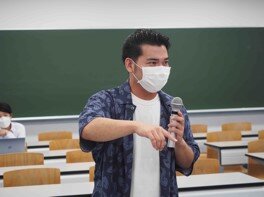
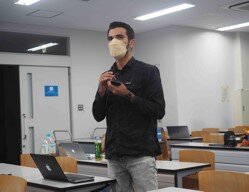
(From the left: Adviser/Hidaka, Adviser/Haris)
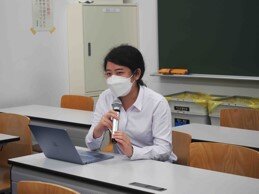
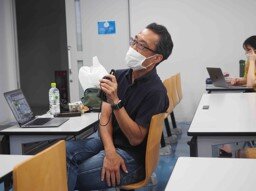
(From the left: Advise/Hayashi, Facilitator/Tsutsumi)
Each team receives feedback which not only assists them in polishing their ideas and presentations, but also forms a bridge to connect with each other.
In the third part of the lecture, Mr. Tsutsumi discusses how to present a business concept and how to consider a business model with growth potential. This knowledge enabled the students to think more critically. Students are also able to give better presentations as a result of the examples provided in the lecture.
In the final part, the students discussed with one another how to prepare for the final presentation.
What the participants learned?
With the help of this excellent course, I have been able to determine the value of the business and who might be potential customers. Furthermore, I discovered a number of scientific methods that could assist us in creating a successful business. During the lecture, one sentence is repeated repeatedly: fail fast, fail cheap, and fail smart. Not only can this be a valuable resource for business purposes, but also for my future.
In addition to gaining knowledge during the lecture, I also gained a great deal of insight into how to cooperate with others. The challenge of becoming more and more understanding of one another over time is always present. Nevertheless, as long as everyone shares the same goal, and is willing to understand and respect others, there should be no problems. In this process, it is extremely important to be able to accept the opinions of others who differ from your own.
As a result of this lecture, we will gain both scientific knowledge as well as communication skills and a spirit of cooperation.
(Reported by: Jingyu Quan, D1, Artificial Intelligence, School of Computing, OPEN student)

